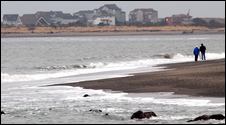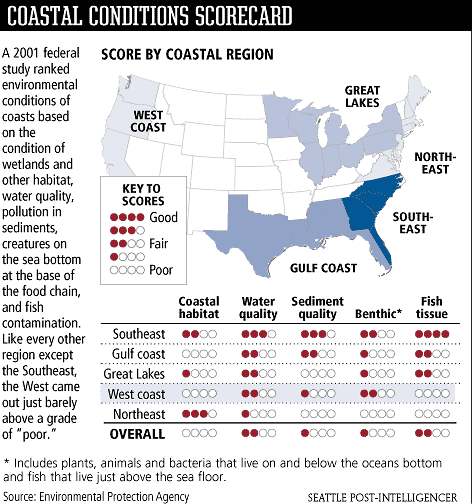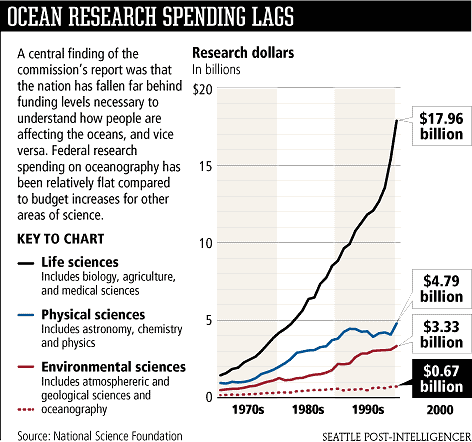|
Immediate measures needed to save oceans
Too many years of doing nothing, commission says
By Robert McClure and Charles Pope
Reporters
SEATTLE POST-INTELLIGENCER
21st April 2004
Americans must get serious now about protecting oceans battered by overfishing, pollution and coastal development, a bipartisan government panel said yesterday in the first major federal look at ocean health in a generation.
Otherwise, the group said, managing the nation's oceans will grow increasingly conflicted as fish farms, wind-power development, mining and projects not yet envisioned move out into waters inside the 200-mile limit of U.S. control.
Jeff Larsen / P-I
Oceanfront homes at the southern end
of the peninsula at Ocean Shores represent a
national trend of people moving to the coasts,
threatening ocean health.
Congress and President Bush need to double spending on ocean research, revamp the way the federal government regulates uses of the ocean, and mandate that science -- not politics -- decides how much fishing is too much, said the draft report of the U.S. Commission on Ocean Policy. Bush appointed the group based largely on congressional recommendations.
"Major changes are urgently needed," the commission's report said. "Reform ... needs to start now, while it is still possible to reverse distressing declines, seize exciting opportunities and sustain the oceans."
In a news conference in Washington, D.C., commission members cited the flagging health of Puget Sound and Chesapeake Bay as evidence that action is urgently needed.
"Our oceans and coasts are in trouble, and we as a nation have a historic opportunity to make a positive and lasting change in the way we manage them before it is too late," said retired Navy Adm. James Watkins, the commission's chairman. "Too many years of inattention and lack of investment are threatening this national treasure."
The commission recommends a $5 billion-a-year Ocean Policy Trust Fund, drawn partly from fees paid by oil companies for offshore oil and gas leases. That troubles some, including an adviser to Gov. Gary Locke, who said it could be an incentive to start drilling for oil off Washington's coast.
The National Marine Fisheries Service and its parent agency, and the whole structure for regulating fish catches, were created in the wake of a 1969 report by another national commission. But since then, there has been no comprehensive federal look at the way America treats its oceans.
The commission spent 2 1/2 years travelling the country to hear from hundreds of scientists, fishermen, environmentalists and others concerned about issues affecting the United States' 4.4 million square miles of ocean territory -- larger than the nation's land mass.
Yesterday's report follows, and in many ways echoes, a major research effort unveiled in June by an independent bipartisan panel, the Pew Oceans Commission. That panel recommended stronger conservation measures, such as setting aside "marine reserves" where no fishing is allowed. Commercial fishing groups and conservatives in Congress had looked to the federal commission, appointed by Bush and Congress, as a counterweight.
That didn't happen. For instance, while the Pew panel strongly pushed the idea of reserves, the U.S. commission said simply, "appropriately designed and implemented marine protected areas have proven useful."
"Although the reports are not identical, they're very similar and mutually supportive," said former Coast Guard Adm. Roger Rufe, a member of the Pew commission and president of The Ocean Conservancy. "You have two commissions that have both come to the same conclusion: Our oceans are in trouble and we need to make significant policy changes."
The federal commission's 500-page report earned generally positive reviews across Capitol Hill as lawmakers acknowledged that a more aggressive and unified approach is needed to protect oceans.
"Washington's shelves are absolutely stacked full of commission reports about which nothing is done. I hope this study is different," said Sen. Chris Dodd, D-Conn.
Some environmental groups embraced the report, saying it draws attention to problem that has suffered from "benign neglect."
"It's Pew Lite," said David Helvarg of the Blue Frontier Campaign, which is creating a network of ocean advocates to press for congressional action.
Helvarg said he was pleasantly surprised because the makeup of the federal commission and the Pew panel differed so much, "with (Pew) weighted heavily toward fishermen and environmentalists and scientists, and the other pretty top-heavy with industry and admirals."
The federal report pointed out that over the last three decades, 37 million people have moved to the coasts. That intense development is compromising ocean health in a number of ways, including stormwater pollution washing off streets, parking lots and yards. The commission called for a combination of money from Congress, regulation by federal agencies and incentives to solve the problem.
Perhaps the most-watched recommendation of the commission was to mandate that science, not politics, determine the safe level of fish catches.
The Magnuson Act passed in 1976 after the last national ocean report set up eight fishery-management councils that govern catch levels in different regions of the country.
Yesterday's report singled out the North Pacific Fishery Management Council for virtually always sticking to the recommendations of its scientific advisers. That council watches over the nation's largest fishery near Alaska, which includes many vessels based in Seattle and elsewhere in the Pacific Northwest.
"The (catch level) decision has to be insulated from the political pressures that inevitably come up about who catches what in what year," said Mark Hershman, a University of Washington professor of marine affairs who served on the U.S. commission.
But Hershman sought to soothe the fears of fishermen who suspect their power is being usurped. The fishery councils are dominated by commercial and recreational fishing interests and representatives of state agencies that are their close allies.
"Separating the decision from the fishermen to the extent you don't even talk to the fishermen, where you don't even get their input as to what (they) see as to how this resource is doing, that doesn't make any sense," Hershman said.
Although the North Pacific council is doing well relative to others, it isn't yet fully complying with another key recommendation by the commission: to manage fish catches in a way that takes into account the ocean food web. Currently councils measure stocks of each species individually, and make decisions based on that. They don't usually pause, for example, to figure out how depleting one species might affect one or more others.
Rep. Jay Inslee, D-Wash., said he plans to introduce legislation requiring the best science be used by regional fisheries councils. The study commission rapped councils for too often failing to listen to scientists.
"A lack of adequate scientific information has not been the main culprit in most instances of overfishing," the report said.
But Robert Alverson, director of the Fishing Vessel Owners Association, a commercial fishing group based in Seattle, said it was precisely the cause of the overfishing of groundfish -- often sold as "snapper" -- off the West Coast.
The collapse of groundfish stocks here, which led to huge cuts in the allowable catch, has been cited alongside the collapse of cod in New England as some of the biggest blunders made by the fishery councils.
The errors were traceable to lack of scientific knowledge, said Alverson, a member of the Pacific council.
For example, scientists in the 1980s and early '90s said the fish lived maybe 15 or 20 years. Then they discovered groundfish have lifespans more akin to humans. So the fish have reproduction rates closer to humans, meaning that they were being caught much faster than they could reproduce.
"Since the early '90s, the council has pretty much toed the line on what (scientists) told them, but the science didn't get corrected until the late '90s," Alverson said. "One of the problems you have in the best science is, what if the best science is wrong and you adopt it anyway?"
The report released yesterday targeted that problem directly, calling for a huge increase in the amount of ocean research. Over the past 25 years, the slice of the national research budget devoted to oceans slipped from 7 percent to 3.5 percent.
While the Pew report called for a centralized Department of Oceans in the federal government, the U.S. panel recommended a more modest plan. It would install a presidential adviser and a Cabinet-level National Oceans Council to coordinate federal activities
The federal commission also took pains to highlight the need for states to have a say in ocean policy.
"Our existing, fragmented system of managing oceans and coasts is simply not up to the task of solving the problems were facing and those we see ahead," said Watkins, the commission chairman. "A Byzantine patchwork of 15 federal departments and federal agencies governs ocean and coastal policy in addition to state and local policy."
Watkins and senior members of Congress said Bush would have to take a strong and public interest in the subject if change is to come.
Or, other commission members said, that initiative might have to come from Democratic contender John Kerry, who attacked Bush's environmental record yesterday and promised strong support for ocean health. Even with vigorous support from the White House, however, finding agreement in Congress will be difficult. More than a dozen bills have been languishing in the House and Senate for a year and sponsors said yesterday they are hoping that attention from the report will trigger action.
Jane Lubchenco, an Oregon State University marine biologist and member of the Pew Commission, compared U.S. ocean policy in recent years to a drifting boat.
"We haven't known where we are or where we're heading," she said. "What the two commissions do is give us a compass and a strong bearing. What remains to be seen is if we will have the leadership at the helm to capitalize on that new compass and bearing, and take us where we need to go."
RECOMMENDATIONS
The U.S. Commission on Ocean Policy released a report yesterday containing more than 200 recommendations for federal, state and local action. Some key recommendations:
Manage the United States' 4.4 million square miles of ocean territory based on the health of entire ecosystems, which cross political boundaries.
Create a National Ocean Council within the White House that is headed by a presidential assistant for oceans and made up of the directors of federal agencies with ocean responsibilities.
Create voluntary regional ocean councils to recommend solutions of ocean issues in their area, such as salmon in the Pacific Northwest. They would receive support from the National Ocean Council.
Set measurable goals for reducing water pollution, particularly runoff pollution from inland agriculture and urban development. Also, strengthen the link between coastal management and rules governing inland areas that contribute to ocean pollution.
Give local governments a way to shift development away from sensitive or hazard-prone shoreside areas.
Double U.S. investment in ocean research and move forward on a national "integrated ocean observing system" that gathers climate and other information related to oceans.
Reform regional fisheries management councils by separating scientific assessments on how much fishing is sustainable from economic and political decisions on how many fish may be caught.
Ratify the United Nations Convention on the Law of the Sea, an international treaty setting each nation's rights and responsibilities within exclusive economic zones, which extend 200 miles from coasts.
Establish an ocean trust fund based on revenue from offshore oil and gas drilling and other emerging offshore uses like fish farming and wind energy to pay for putting new ocean-protection measures into effect.
Read the report
On the Web: U.S. Commission on Ocean Policy: www.oceancommision.gov
SEATTLE OCEANS FORUM
What should Washington tell the U.S. Commission on Ocean Policy about what its final report should say? That's the question Gov. Gary Locke is asking citizens as he and other governors prepare to weigh in on the panel's draft report.
A forum sponsored by Locke is planned for May 13 at the Seattle Aquarium. Call 360-902-0676 for more information.
The governor's office is accepting written comments through May 17. Send to:
Gov. Gary Locke, Attn: Ocean Commission Comments, P.O. Box 40002, Olympia, WA 98504
P-I reporter Robert McClure can be reached at 206-448-8092 or robertmcclure@seattlepi.com This report includes information from Cox News Service.
Top
|


